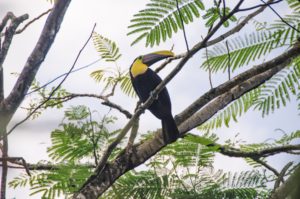 A lot of attention has been paid to how climate change can drive biodiversity loss. Now, MIT researchers have shown the reverse is also true: Reductions in biodiversity can jeopardize one of Earth’s most powerful levers for mitigating climate change. In a paper published in PNAS, the researchers showed that following deforestation, naturally-regrowing tropical forests, with healthy populations of seed-dispersing animals, can absorb up to four times more carbon than similar forests with fewer seed-dispersing animals. Because tropical forests are currently Earth’s largest land-based carbon sink, the findings improve our understanding of a potent tool to fight climate change. “The results underscore the importance of animals in maintaining healthy, carbon-rich tropical forests,” says Evan Fricke, a research scientist in the MIT Department of Civil and Environmental Engineering and the lead author of the new study. “When seed-dispersing animals decline, we risk weakening the climate-mitigating power of tropical forests.”
A lot of attention has been paid to how climate change can drive biodiversity loss. Now, MIT researchers have shown the reverse is also true: Reductions in biodiversity can jeopardize one of Earth’s most powerful levers for mitigating climate change. In a paper published in PNAS, the researchers showed that following deforestation, naturally-regrowing tropical forests, with healthy populations of seed-dispersing animals, can absorb up to four times more carbon than similar forests with fewer seed-dispersing animals. Because tropical forests are currently Earth’s largest land-based carbon sink, the findings improve our understanding of a potent tool to fight climate change. “The results underscore the importance of animals in maintaining healthy, carbon-rich tropical forests,” says Evan Fricke, a research scientist in the MIT Department of Civil and Environmental Engineering and the lead author of the new study. “When seed-dispersing animals decline, we risk weakening the climate-mitigating power of tropical forests.”